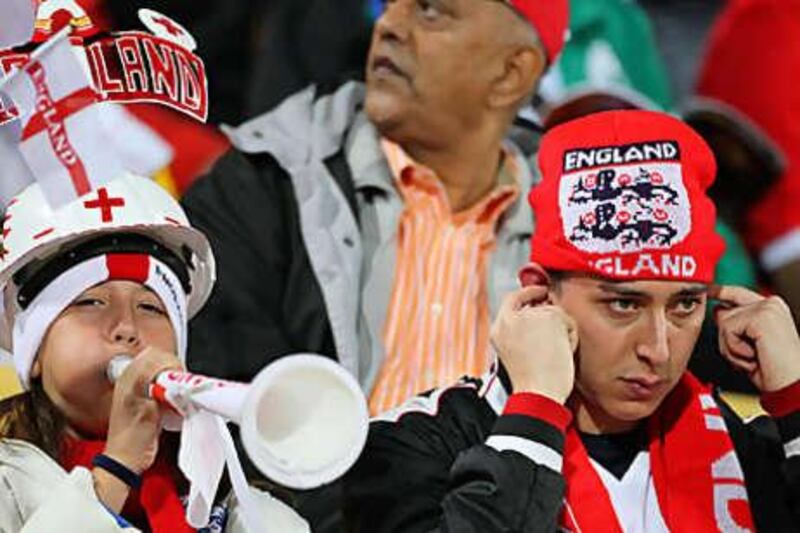Like it or loathe it, the vuvuzela has taken over the World Cup. Dodgy balls, low-scoring games and goalkeeping errors may be talking points, but the word, or sound, on most supporters' lips is the distinctly African horn with questionable musical values that has ransacked the tournament. It has become an international debate too. At only 75 rand (Dh36), vuvuzelas are everywhere in South Africa. Cultural significance and a sense of fun have merged in the metre-long, plastic-funnelled instrument's penetrating din. This phenomenon is not restricted to South African venues, or indeed the Rainbow Nation. Public places, streets and homes the world over, courtesy of television and quick-minded profiteers, are abuzz with a noise that has been described as "a bees' nest" and "an ailing cow" on South African radio.
At this rate, the vuvuzela, more than the footballing standards, is set to be Africa's World Cup legacy . But for every horn-blowing reveller tooting his or her joy, there is a purist decrying the fact ear plugs are being sold at football matches. Calls for the vuvuzela to be banned inside stadiums have fallen on deaf ears. Sepp Blatter, the Fifa president, is among those who insist playing it is a moral right.
"I don't see banning the music traditions of fans in their own country," Blatter wrote on Twitter. "Would you want to see a ban on the fan traditions in your country?" It is a tradition that is swiftly moving beyond the shores of its origin. British media have reported that Sainsbury's, a supermarket chain, sold 22,000 vuvuzelas in 12 hours before England's game against the US on Saturday, while the online retailer Amazon reported sales were up 1,000 per cent.
Trade is good in Cape Town, too. "I started selling late compared to everyone else, but since Wednesday I've sold about 1,000," said Saleem Haffajee, a street vendor with a stall on the corner of Darling and Plein - right outside the city's official Fifa Fan Fest. "I'd say I've sold 30 per cent to tourists and 70 per cent to locals. The vuvuzela is brilliant, it used to irritate me - until I started making money off it."
One of Haffajee's customers was Karim Chekroun, an Algerian fan getting ready for his country's clash with England in Cape Town on Friday. "I just bought mine 10 minutes ago. It's difficult to play though, I'm still learning," he said. "It is funny and something culturally important to Africa. I think it will spread everywhere after the tournament. I'm going to buy another two for my friends at home."
But the prospect of the in-demand horn becoming a fixture in post-World Cup club football has not gone down well with European fans. "I think they're pretty annoying, really noisy and it doesn't seem like anyone is playing tunes," said Niels Christian Nielsen, a Denmark supporter. "It's just noise all the time. You can't hear the songs and cheering of other fans in the stadiums, you can't tell if it's England, Denmark or Holland that you are watching. They're not wrong, just annoying. I hope they're not exported to Denmark after the tournament."
Cristiano Ronaldo, the Portugal captain, summed up the player-supporter polarity earlier this week. "It is difficult for anyone on the pitch to concentrate," the Portugal captain said at a press conference. "A lot of players don't like them, but they are going to have to get used to them. Teams have done nothing but criticise the vuvuzelas, but you have to respect them." A growing consensus seems to show that is exactly what fans are prepared to do during this World Cup odyssey in Africa, but it is not something that will be tolerated when the world's greatest show - and all its eccentricities - is over.
"They are too loud and they should be banned at matches," said Graham Watton, an England fan eagerly awaiting the same Friday clash as Chekroun. "You can't hear any singing or chants, the vuvuzela drowns out everything. Africans sing and chant too in games, they should do that instead of playing these things." Football, Watton added, is not ready for a vuvuzela take-over. "I think they'll ban them in the Premier League, I don't think they'll be allowed inside English stadiums."
Switzerland added a vuvuzela accompaniment to training sessions before their World Cup opener against Spain tonight as Ottmar Hitzfeld, their coach, tried to teach his players how to cope with the din. He scheduled an extra public training session and invited South African fans, knowing they would bring their plastic horns. He said it was good practice for his players to get used to communicating on the pitch when their voices are drowned out by the constant monotone buzz of the vuvuzelas.
Television channels are taking action too. Host Broadcast Services, the company that provides the broadcasting feed for the World Cup, is doubling its audio filters to reduce the constant blaring buzz of vuvuzelas. Broadcasters around the world have received complaints from viewers, and several have taken their own measures to try to reduce the drone. In England, the BBC are mulling over a vuvuzela-free option for irked viewers. The broadcaster is considering offering viewers the possibility of muting most ambient noise while maintaining game commentary through a digital service on a separate channel.
emegson@thenational.ae





